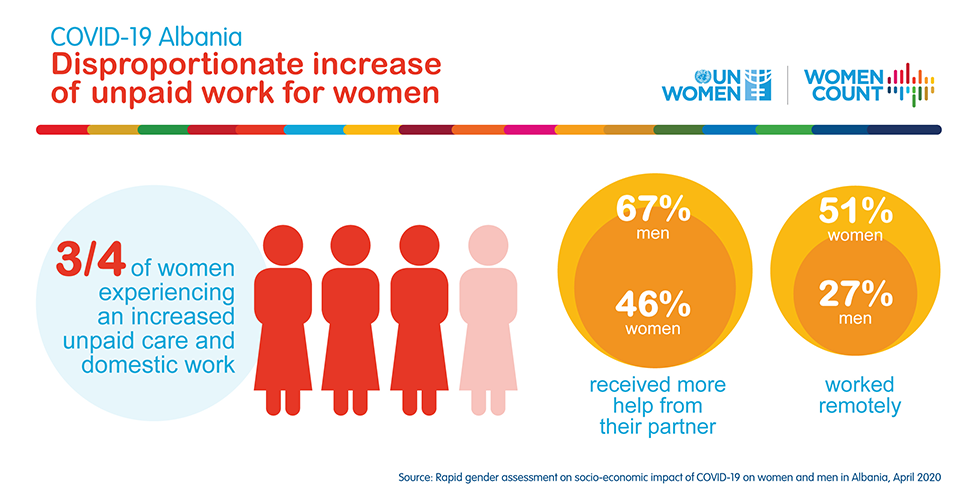Press release: COVID-19 is taking a higher toll on women – shows UN Women Albania rapid assessment
Date:

COVID-19 has been disproportionately affecting women compared to men, and risks to deepen gender inequalities, a rapid gender assessment by UN Women Albania shows. The survey was conducted from April 17 to 26 (prior to the issuance of the second GoA support package), in partnership with IDRA Research & Consulting. It measured the socio-economic impact of the pandemic and how it affected the livelihoods of women and men. 1300 persons from different age groups, family status, and location participated in the survey, answering questions about access to information on COVID-19, health, work and income, time use and support needs.
The Rapid Gender Assessment reveals that Albanians are largely satisfied with COVID 19 information (80% of respondents), with women slightly likelier to use internet and social media as a primary source of information (32% women compared to 28% men).
One in five people struggled to access health services, and, both women and men faced challenges to find medical supply for personal protection against COVID-19. Women reported such challenges more frequently (51% compared to 43% men). Among age groups, young women 18-24 reported a higher prevalence of facing major/some difficulty in accessing health services and medical supplies. With regards to psychological and mental health, women are affected at much higher rates compared to men (69% vs. 57%), with a widening gap among active working women (35-44 years) who experience higher psychological distress compared to men in the same age group (72% vs 58%). The gender gap of mental health impact goes up to 21 points in rural areas. In addition, women who experienced or witnessed domestic violence reported higher psychological distress.
COVID-19 confinement measures have significantly increased the burden of unpaid work for both men and women. However, the assessment confirms that women have been taking on more household chores and care work, and every second woman reported an increase in performing at least two activities related to unpaid domestic work. 46% of women and 67% of men reported receiving more help from their partner, which confirms the unequal distribution of unpaid work.
The closure of non-essential businesses had an immediate impact on jobs, with almost 15% of respondents reporting to have lost their jobs. Men appeared to face a greater risk of unemployment (17%) compared to women (12%), partly due to a large proportion of them being employed in sectors that were heavily affected by the lockdown. Results also highlight a disproportionate impact on working time for employed women: regardless of employment status, women are more exposed to decrease in working hours and potential loss of income. Self-employed women in the 45-54 age group were hit harder (66.7%) by reduced work. Almost one in two (46%) self-employed women living with children had to cut down their working time, mainly to look after children and housework.
The Rapid Gender Assessment also confirms that both women and men have experienced decrease in their income. One in two reported reduced earnings from employment, while two-thirds saw a loss of income from farming. 74% of women relying on remittances reported a decrease from such source of income during the health emergency.
This assessment was supported by the regional project “Women Count”, and two UN Joint Programmes, “Ending Violence against Women in Albania” financed by the Swedish Government and “Improving municipal social protection service delivery” financed by the Joint SDG Fund.UN Women will continue to advocate for and support the integration of a gender perspective in the socio-economic response to COVID-19, duly informed by sex disaggregated data and gender analysis.